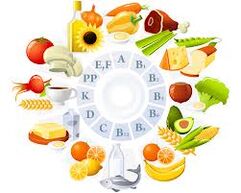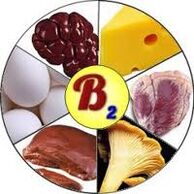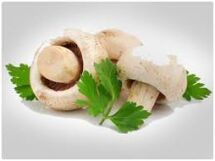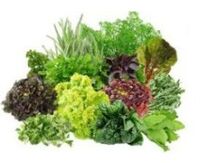
Everyone knows that vitamins are necessary for our body, but only a few people know that these substances are required for the proper functioning of the brain.In order to maintain memory and thinking, certain groups of vitamins are required that are further discussed.
B vitamins B The most important thing for memory
B -vitamins are the most important for the nervous system.We can say that representatives of this group have the greatest influence on the memory and thinking of a person.They support the work of nerve cells and also prevent early aging, protect the brain from overload and stress.The low content or the complete lack of B vitamins leads to serious diseases of the nervous system and reduces the memory and intelligence of a person.
This group of vitamins includes the most important vitamins for the brain - B1, B2, B3, B5, B6, B9, B12.
Thiamin - Vitamin B1
Tiamin - Vitamin B1, means "vitamin of the mind", it has the greatest influence on mental skills and memory.The thoughts are confused with his lack and the memory decreases.Vitamin B1 protects the nervous system directly and is involved in supplying the brain glucose.
With good nutrition, one person does not lack this vitamin, since it is contained in a large number of products: oatmeal and buckwheat and buckwheats (much in the shell of grain and bowls), bran, peas, nuts, carrots, radishes, fel, potatoes, spinach - are the suppliers of Thiamin.

It is well absorbed, but also quickly and destroyed, especially under the influence of alcohol, nicotine, sugar, teas.
Symptoms occur with a lack of vitamin B1:
- Storage acceptance;
- Muscle weakness;
- High physical and mental fatigue;
- Violation of coordination and gait;
- Dust in the limbs;
- inappropriate irritability;
- oppressed mood;
- Tears and fear;
- Sleep disorders.
In severe cases, polyneuritis, paralysis and paresis of the limbs can develop.The function of the cardiovascular system is also affected, changes from the stomach intestine tract (stool disorder, constipation, nausea) can be observed.
Riboflavin - vitamin B2
Vitamin B2 - Riboflavin is a "vitamin of energy", an accelerator of energy and exchange in our body, including accelerations of the mental processes in the brain, participates in the synthesis of nerve cells and the work of neurotransmitters (biologically active substances with which nerve impulse is transmitted into nerves).With the lack of sports, fatigue is brought more often than strength and activity.Vitamin B2 tolerates high temperatures well, but quickly destroys in the light.
Riboflavin suppliers are meat and dairy products.This is the liver, kidneys, eggs, dairy products, yeast, tomatoes, cabbage, rose hips.

With a lack of vitamin B2 there is:
- Headache;
- Acceptance of the speed of the mental processes;
- Sleepiness;
- Loss of appetite;
- Loss of body weight;
- Weakness.
In addition, there are changes in the skin - ulcers and cracks in the corners of the mouth (unit), dermatitis of the skin of the chest and face;Violations of the view - photophobia, mourning due to inflammation of the cornea and the mucous membrane of the eyes;The synthesis of adrenal hormones is impaired.
Nicotinic acid - vitamin B3 or PP
Nicotinic acid (nicotinamide, niacin) - vitamin B3 - can be referred to as "vitamin rest".Vitamin is involved in the synthesis of enzymes and helps to extract energy from food.With a lack of deficiency, the body experiences fatigue, depression, depression and insomnia.In addition, Nicotinamidvnnoisly participates in the biosynthesis of hormones (estrogen, progesterone, cortisol, testosterone, insulin and others).
The overwhelming amount of vitamin B3 consists in animal products: these are liver, eggs, kidneys, lean meat;Plant products - asparagus, parsley, carrots, garlic, green peas, pepper.
In the absence of this, Pellagra develops in food.The main symptoms of this state of this state are diarrhea (diarrhea), dermatitis (inflammation on open skin surfaces) and dementia (acquired dementia).
Pantotic acid - vitamin B5

Vitamin B5 - pantothenic acid - This vitamin can be found in many products.This vitamin is involved in the fat metabolism in the transmission of nerve impulses and also triggers the mechanisms of skin recovery.It was previously assumed that this vitamin cannot be missing.
In view of the fact that more than half of the panthenic acid is destroyed in the storage and preparation of products, such symptoms can occur:
- River flow;
- Memorial violation;
- Impairment of sleep;
- Headache;
- Paresthesia (tingling) of the arms and legs;
- Muscle pain.
To compensate for the lack of vitamin B5, you have to include a variety of products in the diet: meat, grain, hazelnuts, offal, yeast.A considerable amount is contained in legumes, fresh vegetables, mushrooms and green tea.
Pyridoxin - vitamin B6
Vitamin B6 - pyridoxin - is involved in the synthesis of neurotransmitter, including serotonin.Hence his other name "vitamin antitepressant".
The following symptoms occur in the event of a deficiency:
- Sleepiness;
- Irritability;
- Inhibitory thinking;
- Depression;
- Fear fear.
Vitamin B6 in large quantities is contained in yeast, grain grains, legumes, bananas, meat, fish, potatoes, cabbage, pepper, cherries, strawberries.
In addition, vitamin B6 influences metabolism, the condition of the cardiovascular system, the immunity, the condition of the skin, the synthesis of hormones, hydrochloric acid in the stomach and the absorption of vitamin B12.
Folic acid - vitamin B9

Folic acid - vitamin B9 - is involved in the synthesis of neurotransmitter, including dopamine and serotonin, ie the processes of suggestion and inhibition in the central nervous system.Vitamin B9 is also involved in the exchange of proteins.The transfer of genetic information during the development of the fetus is required for the formation of normal blood cells.And in combination with vitamin B5, the hair of the hair slows down.
Symptoms occur with the lack:
- Storage deterioration;
- Fatigue;
- A feeling of fear;
- Anemia;
- Insomnia and apathy.
Folic acid is located in large quantities in freshly dark green vegetables (asparagus, spinach, salad).In beans, wheat, avocados there is a smaller amount in the liver, egg yolk.
Cyanocobalamin - vitamin B12
In nature, it is only synthesized by microorganisms, bacteria, blue -green algae and mainly accumulates in liver and animals.Neither plants nor animals synthesize it.This "red vitamin" is contained in animal products: fish, liver, kidneys, heart, oysters is also in seatang, soy.Vitamin B12 helps our body to move from vigilance into a "sleeping" regime for the normalization of mental processes and to transfer it in the long term in the long term.
The lack of cyanocobalamine leads:
- chronic fatigue;
- Confusion;
- Hallucinations;
- Call my ears;
- Irritability;
- Dizziness;
- Sleepiness;
- Reduce memory;
- Visual impairment;
- Dementia;
- Depression.
In addition to B vitamins, there are other vitamins for memory and thinking.
Ascorbic acid - vitamin C.

Ascorbic acid is a very strong antioxidant and protects against the oxidative processes of the body.It is necessary to maintain the work of neurotransmitter in the brain.
Vitamin C is not synthesized in the body, it comes with food: rose bouncing, black currant, seabuckle, parsley, sweet red pepper, citrus fruits, green onions, cabbage, horseradish, nettle made of animal products that are only included in the liver.
Tokoferola -Acetate - Vitamin E
This fat -soluble vitamin is initially a great antioxidant that alleviates brain tissue of toxins and free radicals.It is included in the lipid composition of cell membranes.A diet that contains vitamin E rich helps protect the body from heart attacks and atherosclerosis, which prevents development from dementia.
In addition, it is necessary to include non-refined oils (olive, soy, corn) as well as green peas, wheat and rye souls, beans, green salad, lentils, oats, oats.
Calciferol - vitamin D.
It enters the body with food and is synthesized under the influence of ultraviolet rays in the skin.Calciferol - "main leader" of the calcium exchange in the body.In addition to an important effect on the formation of bones and teeth, growth and development of cells, vitamin D is required for the proper transmission of nerve impulses and muscle contractions.
Animal products have a large amount: butter, fat fish (herring, tuna, salmon, mackerel), fish oil, liver, egg yolk.
Bioflavonoid - vitamin P.

The main effect of vitamin P is to reduce the permeability and fragility of capillaries.Together with ascorbic acid, the body protects against oxidative processes.This prevents bleeding in the brain.We are rich in vitamin -p -citrus fruits, rosehip fruits, black berries, green tea, apples.
In addition to a balanced diet, the use of vitamins, other options for preventing dementia should not be forgotten.This is the only way to achieve a good memory, strength and optimism in old age.













































































